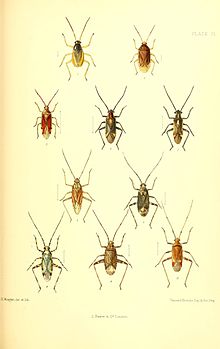Phytocoris populi
You can help expand this article with text translated from the corresponding article in German. (July 2019) Click [show] for important translation instructions.
|
| Phytocoris populi | |
|---|---|

| |
| Phytocoris populi depicted in Edward Saunders Hemiptera Heteroptera of the British Islands (figure 7) | |
| Scientific classification | |
| Domain: | Eukaryota |
| Kingdom: | Animalia |
| Phylum: | Arthropoda |
| Class: | Insecta |
| Order: | Hemiptera |
| Suborder: | Heteroptera |
| Family: | Miridae |
| Genus: | Phytocoris |
| Species: | P. populi
|
| Binomial name | |
| Phytocoris populi | |
Phytocoris populi is a species of plant bugs belonging to the family Miridae, subfamily Mirinae.[1] It is widespread in Europe but absent from Albania, Andorra, Azores, Canary Islands, Cyprus, Faroe Islands and Iceland.[2] then across the Palearctic to the Russian Far East and Siberia.
Phytocoris populi lives on various deciduous trees, especially on poplars ( Populus ) and willows (Salix ), more rarely on linden trees ( Tilia ), birches ( Betula ), alders ( Alnus ), ash trees ( Fraxinus ) or fruit trees. Both the nymphs and the imagines sit during the day predominantly in cracks of the bark on the trunk of the host plants. They feed predominantly as predators on aphids , psyllids, Psocoptera and other small invertebrates that live on the trunk of the plants. The adult bugs can be observed from July to September. They are very active in flight.
References
- ^ Kerzhner I. M.; Josifov M. (1999). "Family Miridae". In Aukema, Berend; Rieger, Christian (eds.). Catalogue of the Heteroptera of the Palaearctic Region. Vol. 3, Cimicomorpha II. Amsterdam: Netherlands Entomological Society. pp. 1–577, pages 156–160. ISBN 978-90-71912-19-1.
- ^ "Phytocoris (Phytocoris) populi (Linnaeus, 1758)". 2.6.2. Fauna Europaea. August 29, 2013. Archived from the original on October 14, 2013. Retrieved October 13, 2013.
